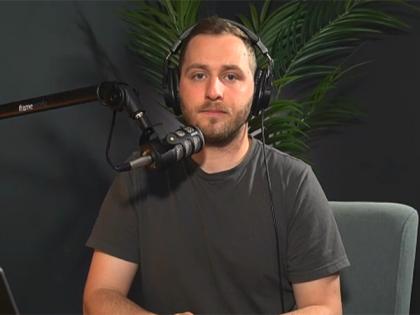"Modi at G7 a chance to reset India-Canada ties amid Khalistan tensions": Canadian podcaster Josh Udall
By ANI | Updated: June 11, 2025 12:38 IST2025-06-11T12:33:49+5:302025-06-11T12:38:22+5:30
Ontario [Canada], June 11 : As Prime Minister Narendra Modi participates in the G7 Summit in Kananaskis, Canada, from ...

"Modi at G7 a chance to reset India-Canada ties amid Khalistan tensions": Canadian podcaster Josh Udall
Ontario [Canada], June 11 : As Prime Minister Narendra Modi participates in the G7 Summit in Kananaskis, Canada, from June 15 to 17, his presence signifies more than just India's growing global influence it presents an opportunity to reset and redefine bilateral relations between India and Canada, says Canadian political commentator and podcaster Josh Udall.
Udall, who applies his expertise in behavioural research and political analysis to Canadian public discourse, sees this moment as pivotal not just for economic diplomacy, but also for confronting longstanding irritants in the relationship, especially the issue of Khalistani extremism.
In an exclusive interview, Udall dissected the complexities and political undercurrents shaping the evolving dynamic between Ottawa and New Delhi.
According to Udall, Prime Minister Modi's visit to the G7 where he's likely to meet with Canadian Prime Minister Mark Carney offers Canada a critical opening to move past the chill that marked Indo-Canadian relations under Justin Trudeau.
"Mark Carney is the economic guy. He's the one you call in a crisis," Udall noted, pointing out that Carney's chief interest is revitalising Canada's economic relationships, particularly beyond the shadow of the United States. India is now the world's fourth-largest economy. It only makes sense to pursue a strong trade partnership with them," he said.
Udall emphasised that Carney's push for economic ties is not rooted in any deep understanding of the Indo-Canadian political baggage, especially the divisive Khalistan issue. "There's very little political will in Canada to address the Khalistani extremism that India is concerned about," he said, underscoring the wide gap between Canadian public perception and Indian security priorities.
Udall was candid about the domestic ignorance surrounding the Khalistan issue in Canada. "Most Canadians have no idea," he said. "They've heard snippets on CBC or CTV, maybe remember something about Trudeau accusing India of killing a Canadian citizen on Canadian soil, but they don't understand the long and complicated history."
He added that Khalistani narratives dominate Canadian media, with little to no Hindu or Indian nationalist representation providing a counterbalance. "It's mostly Khalistani voices getting airtime," he observed. "That dangerously shapes public perception."
The result, according to Udall, is a skewed understanding of India as an interfering foreign power. "To Canadians, India is starting to feel like the new Russia accused of meddling in elections and domestic politics," he said. This, he argues, makes it nearly impossible to garner domestic support for India's long-pending demand to extradite 26 fugitives linked to extremist activities.
Given this context, Udall believes that the burden of advocacy rests squarely on Prime Minister Modi. "If Modi wants movement on the Khalistan issue or extradition demands, he's going to have to tie those to economic incentives. That's the only language that might move Carney," he said.
Udall was clear-eyed about the challenge. "Carney doesn't know the history, and he won't prioritise it unless it's linked to something he values namely, trade. Modi has to make that case clearly and strategically."
The situation is further complicated by Canada's domestic political landscape. "Carney will see the protests from Sikh groups against Modi's visit, and he will dismiss them. That's his style. But unless there is pressure from voters or political consequences, don't expect him to act on India's security concerns."
One of the most significant shifts, Udall points out, is the political transition from Justin Trudeau and Jagmeet Singh to Mark Carney's administration. He believes this creates a rare moment for recalibration.
"Trudeau's stance toward India was heavily influenced by domestic alliances, particularly with the NDP and Jagmeet Singh," he said. "There were alleged associations between Singh and pro-Khalistan groups, and that coloured Trudeau's approach to India."
Now, with both Trudeau and Singh out of the picture, Udall sees a clean slate. "Carney's gesture of inviting Modi is a sign: let's forget the past and focus on mutual benefit," he said. "It's a soft restart an olive branch."
For Udall, the G7 Summit marks a watershed moment. "What happens at this meeting will dictate the course of India-Canada relations," he asserted. "If Modi and Carney strike the right tone, it could initiate a slow but steady thaw."
However, Udall warns that any progress will be incremental. "This won't be a one-meeting fix. It's going to be a long game for both leaders. Modi wants action on extremism; Carney wants trade. They'll have to negotiate those interests delicately."
He also suggests that even if the bilateral dialogue doesn't immediately yield results on extradition or security concerns, just opening consistent communication lines is a win. "Diplomacy is momentum. If this meeting goes well, it builds trust. And from trust comes progress."
As Prime Minister Modi engages with world leaders at the G7, his interactions with Canada could mark a turning point in a relationship that has long teetered between cooperation and confrontation.
Josh Udall sums it up best: "This is a pivotal moment. Both sides need something India wants a crackdown on extremism; Canada wants new trade partners. If they can meet halfway, it'll be a major win for both democracies."
Whether this G7 meeting becomes a footnote or a foundation stone remains to be seen. But one thing is clear after years of tension, India and Canada finally have an opportunity to rebuild.
Disclaimer: This post has been auto-published from an agency feed without any modifications to the text and has not been reviewed by an editor
Open in app